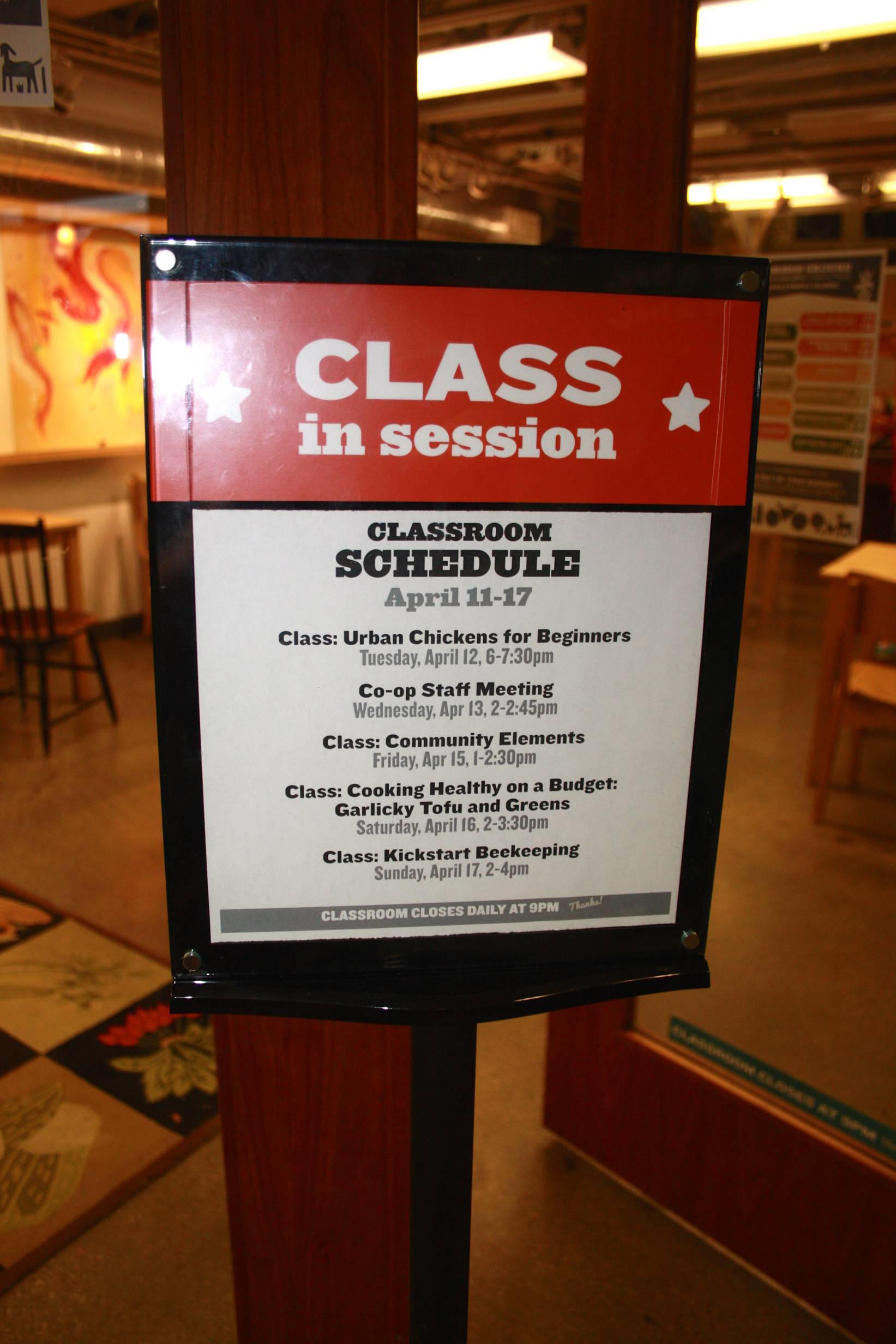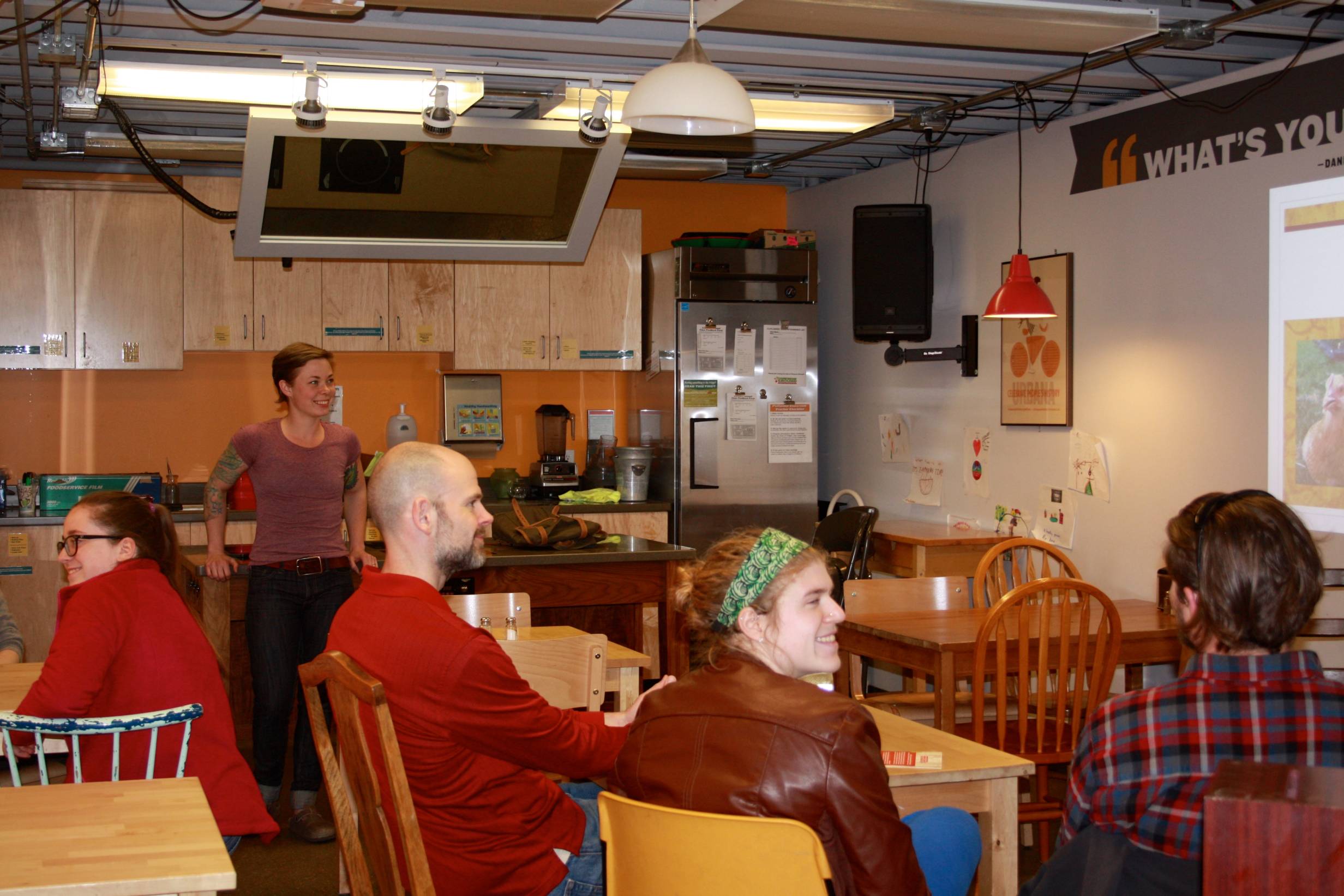As I was driving to my class at Common Ground Food Coop about raising chickens in the city last week, I was trying to imagine what I was in for. Would there be live chickens there? Would I have to touch them? I was excited and a bit hesitant at the same time. Don’t get me wrong, I was eager to learn all about it, but I am a city girl at heart. I was having trouble wrapping my mind around the concept of urban chicken farming. Not anymore, now I can give you the inside scoop.
After I arrived I signed in and perused the classroom. It’s a small room with about  30 seats. There are cozy mismatched kitchen tables and chairs for seating. In the back of the room I was pleased to see a kid’s area. Once I had a look around I found a seat in the back and waited for class to begin.
30 seats. There are cozy mismatched kitchen tables and chairs for seating. In the back of the room I was pleased to see a kid’s area. Once I had a look around I found a seat in the back and waited for class to begin.
The instructor Colleen Wagner knows what she’s talking about when it comes to chickens. She has done countless hours of research, on top of keeping her own chickens here in Champaign-Urbana for the past six years. The question of the hour was: why keep chickens? The answer is for the eggs, for the meat and surprisingly enough, for the entertainment. I learned that chickens can actually be great pets if they are raised from day old chicks. One of things that most surprised Colleen the most while raising chickens was the differences in their personalities.
 Next we touched on the basic supplies you’ll need to care for and house your chicken in the city. I was amazed at how little you actually need. It’s comparable to what you would need to buy when bringing home a house pet. We then talked about what to feed your chickens and any supplements they may need. Did you know oyster shells are a good source of calcium? Well, for chickens they are.
Next we touched on the basic supplies you’ll need to care for and house your chicken in the city. I was amazed at how little you actually need. It’s comparable to what you would need to buy when bringing home a house pet. We then talked about what to feed your chickens and any supplements they may need. Did you know oyster shells are a good source of calcium? Well, for chickens they are.
Once we went over the chicken’s basic needs, we went on to discuss the city ordinances here in Champaign and Urbana. Surprisingly, they differ quite a bit. You must obtain a license first, and make sure you are familiar with your city’s specific ordinances. Urbana has fewer rules than Champaign. Just to name a few: Urbana has no limit on the number of birds you can own but Champaign does. In Urbana you are permitted to have roosters, but in Champaign you are not. When I asked the instructor why she thought the rules varied so much, she explained that it’s most likely because the ordinance that was passed in Champaign is still new. They are still probably working out all the kinks.
It’s important to plan your coop before you get your chickens. Here in Champaign County you must have at least 4 square feet of space per bird. You must also make sure your coop has space for the chickens to run. The larger the area they have to run around the better. Another important thing is to decide if you will use lights or heater for warmth during the winter. I learned that heaters can be a fire hazard, so lights are really the safest choice. You also have consider predators. Here we have possums, raccoons, hawks, and even dogs and cats pose a threat. Making sure you have a proper lock on the coop is a necessity.
lights or heater for warmth during the winter. I learned that heaters can be a fire hazard, so lights are really the safest choice. You also have consider predators. Here we have possums, raccoons, hawks, and even dogs and cats pose a threat. Making sure you have a proper lock on the coop is a necessity.
Now it was onto choosing which breed of chicken you want. It was surprising how many different breeds there are. Each breed has different egg production, climate needs, and level of domesticity. Orpingtons are the most common breed bought for urban chicken farming. They lay the big brown eggs that most beginners are seeking.
 At the end of class Colleen took 10 to 15 minutes to answer questions. One man raised his hand and asked the question I was dreading to hear the answer to: How do you kill the chickens? She handled the question like a pro and delicately explained how to humanely process your meat birds for food. It actually isn’t as gruesome as I thought. If using the right technique, the chicken will sleep though the whole thing. Whew!
At the end of class Colleen took 10 to 15 minutes to answer questions. One man raised his hand and asked the question I was dreading to hear the answer to: How do you kill the chickens? She handled the question like a pro and delicately explained how to humanely process your meat birds for food. It actually isn’t as gruesome as I thought. If using the right technique, the chicken will sleep though the whole thing. Whew!
As class came to a close I reflected back on what I had learned, which was a lot. Our instructor was extremely informative and I could tell she really has a passion for urban chicken farming. Her excitement and plethora of information made me want to buy a coop and get started. The advantages of teaching my children the responsibility of caring for animals, on top of having fresh eggs to eat really makes urban chicken farming attractive for families, and this class made it feel tangible for me and my family. I had a wonderful time and I gained so much knowlege. I highly recommend heading over to the Common Ground Food Coop and checking out their class schedule. I know I’ll be going back soon for a cooking class. Maybe we’ll use some local fresh eggs. I can’t wait!
Check out Common Ground’s class schedule here.
All photos by Rebecca Wells.








